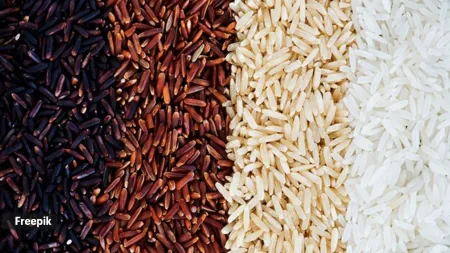Top 5 solutions to combat severe hair fall
Shedding a few strands is as routine as your morning coffee, but when your hair seems to be making a swift exit, it’s time to hit the pause button and investigate. Contrary to the popular belief that your city’s water quality is the sole villain, the truth is a tad more nuanced. There are a combination of factors at play that might be causing hair fall.
Through an Instagram post, Nipun Kapur Sohal, a certified skincare consultant, shared the top 5 things you need to “check, invest and correct” if you’re experiencing severe hair fall.

1. Check your vitamin D3 levels
While the direct impact of vitamin D3 levels on hair quality is not fully understood, deficiency in this vitamin has been associated with hair loss and other hair-related issues. “Vitamin D receptors are present in hair follicles, and adequate levels of vitamin D are believed to be important for maintaining healthy hair follicles. It is also involved in cell growth and differentiation, which are critical processes in hair follicle development and maintenance. Some studies suggest that vitamin D deficiency may be linked to certain types of hair loss, including alopecia areata,” Dr Rishabh Raj Sharma, MD dermatology, senior resident, Noida International Institute of Medical Sciences and Hospital, Noida International University, said.
To improve hair growth and overall health, consider including these vitamin-D rich foods in your diet. “Foods rich in vitamin D include non-vegetarian sources, such as fatty fish (such as trout, salmon, tuna, and mackerel), fish, liver, oil, beef, liver, egg yolk, and cheese. Amongst vegetarian sources, mushrooms can also provide variable levels of vitamin D,” Dr Mahima Agarwal, consultant, dermatology, Fortis Hospital, Shalimar Bagh, New Delhi, suggested.
But the most natural way for your body to produce vitamin D is through exposure to sunlight. “Spend some time outdoors but be mindful of sun protection to prevent skin damage,” Dr Raj said.
2. Use hair growth serums
Topical therapy such as serums form one of the mainstays of dermatological treatment for different types of hair loss, said Dr Agarwal. “Topical therapy gives an advantage of acting only over the affected areas and prevents the chances of side-effects, thereby making them the most commonly prescribed medicines for a person suffering hair loss.”
However, Dr Raj explained that the effectiveness of these products can vary, and individual responses may differ. “Minoxidil, biotin, finasteride, peptides and redensyl are some common ingredients found in hair growth serums.”
Additionally, natural ingredients like pumpkin seed oil, saw palmetto, melatonin extract, caffeine extract and rosemary oil are other topical agents that improve hair growth.
 Minoxidil, biotin, finasteride, peptides and redensyl are some common ingredients found in hair growth serums. (Source: Freepik)
Minoxidil, biotin, finasteride, peptides and redensyl are some common ingredients found in hair growth serums. (Source: Freepik)
3. Consider using a scalp massager daily
Scalp massagers may contribute to improved hair growth by enhancing blood circulation to the hair follicles. “The increased blood flow delivers more oxygen and nutrients, promoting a healthier scalp environment for optimal hair growth. Additionally, massaging the scalp can help reduce stress and tension, which are known to contribute to hair loss,” Dr Raj said.
It is recommended to use a scalp massager daily or on alternate days, however, it’s essential to be gentle to avoid irritation or damage.
4. Sulphate-free shampoos
Sulphates are a type of detergent commonly used in many shampoos, which are responsible for creating the lathering or foaming effect during washing. “While sulphates effectively remove dirt and oil from the hair and scalp, they can strip the hair of its natural oils, leading to dryness. Sulphates may also irritate the scalp, especially for individuals with sensitive skin or those prone to conditions like eczema or dermatitis,” said Dr Raj.
Using sulphate-free shampoos can help mitigate these issues and provide a gentler cleansing experience for the hair and scalp.
5. Add Rosemary oil to your routine
Rosemary oil is believed to offer several benefits for hair health. “Massaging rosemary oil onto the scalp can stimulate blood circulation, thereby promoting hair growth. It may also help inhibit the production of dihydrotestosterone (DHT), a hormone associated with hair loss. Its anti-inflammatory, antimicrobial and antioxidant properties also improve hair quality, texture, and strength,” said Dr Raj.
To use rosemary for your hair, mix a few drops of rosemary oil with a carrier oil (like jojoba or coconut oil) and massage it into the scalp. Before washing it off, let it sit for at least 30 minutes. “You can also add rosemary oil to your regular shampoo and conditioner or combine it with yogurt and honey to create a DIY hair mask,” recommended Dr Raj.
However, it’s crucial to conduct a patch test to look for allergic responses and speak with a dermatologist or medical practitioner, particularly if you have any underlying scalp issues.
Check out the post below:
View this post on Instagram
A post shared by Nipun Kapur Sohal (@nipunkapur)
Disclaimer: The copyright of this article belongs to the original author. Reposting this article is solely for the purpose of information dissemination and does not constitute any investment advice. If there is any infringement, please contact us immediately. We will make corrections or deletions as necessary. Thank you.





